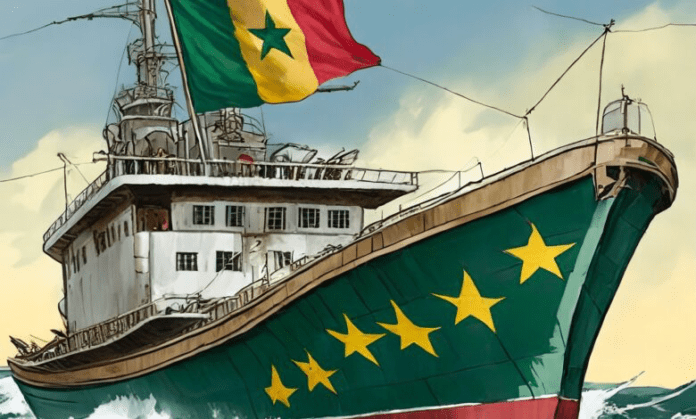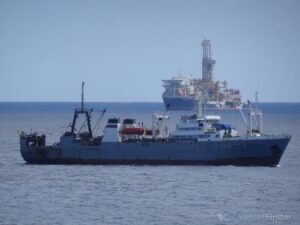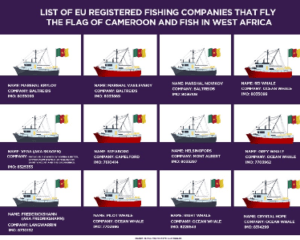
This story was produced in partnership with the Pulitzer Center’s Ocean Reporting Network.
In this investigation, Gideon Sarpong delves into the intricacies of the European Commission’s (EC) fishery policies, focusing on the Commission’s actions, or lack thereof, in West Africa. This complex web encompasses critical issues such as flag of convenience, the targeting and export of over exploited small pelagic fish by EU registered vessels flying the flag of Cameroon and the persistent challenge of IUU (Illegal, Unreported, and Unregulated) fishing practices in West Africa.
BISSAU, Guinea-Bissau — Off the coast of West Africa, from Guinea Bissau to Mauritania, the sighting of the Pilot Whale vessel is a commonplace occurrence. This fishing ship, stretching 96 meters in length, is nearly as extensive as a 100-meter track.
This colossal vessel diligently hauls in significant quantities of small pelagic fish, particularly sardinella, mackerel, and sardines – that form the lifeblood of artisanal fishers in the region.
What is striking is the flag it flies – the vibrant red, yellow, and green emblem of Cameroon.
However, beyond this flag, there is very little that connects the Pilot Whale to Cameroon. In fact, this vessel, also known as Mikhail Verbitskiy, is just one example of many vessels uncovered during this investigation owned and operated by European-based companies accused of participating in IUU related activities while cleverly exploiting the concept of a “flag of convenience.”
In 2020, the Environmental Justice Foundation (EJF), an international organisation committed to monitoring economic and environmental abuses, designated Cameroon’s flag as a “flag of convenience.”
According to marine experts, this label is a tool used by unscrupulous operators to escape accountability for illegal fishing, human rights violations, and other crimes through the manipulation of vessel registrations.
EJF’s findings also revealed a disconcerting fact: more than half (55%) of the vessels in Cameroon’s fleet had been added in the last five years. Even more noteworthy, these new vessels constituted 90% of the fleet’s total tonnage, with 94% of these newcomers under foreign, non-Cameroonian ownership. Nearly all of them operated outside of Cameroon’s waters.
The “Red Card” and EC’s ‘Hypocritical’ Response
This concerning state of affairs led to the issuance of a “Red Card,” by the European Commission in January 2023. Central to this punitive action was the claim of “weak flag state control” which contributed to illegal fishing practices on an international scale.
In issuing the Red Card to Cameroon, the EC announced that, “Member States shall refuse the importation of fishery products from Cameroon even when accompanied by catch certificates,” effectively banning fish imports from the country. This measure took effect immediately following the Red Card’s issuance in January 2023.
In a surprising twist, the investigation uncovered a disquieting reality. Twelve vessels, owned, managed, or associated with companies tied to the European Union, continue to raise the flag of Cameroon.
What’s even more striking is, an analysis of trade data from the European Market Observatory for fisheries and aquaculture (EUMOFA) platform revealed that nearly €10 million worth of fish had entered the EU from Cameroon between January 2023 and September 2023, despite the ban imposed by the European Commission.
Astonishingly, the EC has yet to take any substantive actions against these companies and the continuous flow of fish from Cameroon into the EU market.
An official of the EU IUU Fishing Coalitionstressed that these fishing vessels are able to take advantage of what the European Commission perceives as “Cameroon’s lax fisheries controls, while financial proceeds remain within the EU.”
Beatrice Gorez, the coordinator for the Coalition for Fair Fisheries Arrangements, a consortium of organizations committed to shedding light on the impacts of EU-African fisheries agreements, poignantly asks, “Should the European Union not also seek to target these European based companies?”
Unmasking EU Companies and the Cameroonian Illusion
In a disturbing revelation, the Ocean Whale Fishing Company, founded in 2016, has emerged as a shadowy player in the African fishing industry. Operating a fleet of five fishing vessels across the continent, Ocean Whale’s practices have raised eyebrows, as it exploits regulatory gaps and threatens West Africa’s small pelagic fish stocks, a lifeline for local artisanal fishers.
The company which owns the Pilot Whale purports to be a legitimate entity, officially registered in Malta under the registration number C76874. However, the investigation reveals that the company’s operations transcend borders, exposing an unsettling discrepancy between its registration and the scope of its activities.
What adds a layer of intrigue to this unfolding story is the peculiar choice of flags for its five industrial-sized vessels: the Right Whale, Pilot Whale, Sei Whale, Grey Whale, and the Crystal Hope. Despite operating well outside the boundaries of Cameroon, these vessels proudly fly the Cameroonian flag, sparking questions about the motivation behind such a choice.
The heart of this controversy lies in Ocean Whale’s voracious pursuit of small pelagic fish, a resource in grave peril in West African waters according to scientists. Among these fish stocks, sardinella holds a special place, cherished for its role as a traditional food source for West African communities.
Not only is it affordable and critical to food security in places like Guinea-Bissau and Mauritania, but it also provides essential animal protein, micronutrients, and fatty acids for millions across the region.
AIS data analysed exposed Ocean Whale’s predatory fishing practices within the Exclusive Economic Zones (EEZ) of Mauritania, Guinea-Bissau, Angola, and Namibia. These vessels plunder the very heart of West Africa’s maritime resources, disregarding scientific concerns about sustainability.
In October 2023, the Joint Scientific Committee, tasked with overseeing the implementation of the EU-Mauritania fisheries agreement issued a report that amounted to an indictment of EU fishing fleets in the West African region.
The report noted that the EU fleet fishing for small pelagic in West Africa, particularly the East European vessels, continue to “disregard their obligations to embark scientific observers on board,” while they fish unsustainably.
The small pelagic fish, known for their migratory patterns, traverse the EEZs of several West African states, creating a complex web of overfishing and exploitation.

Food and Agricultural Organisation dataspanning several years, paints a grim picture of sardinella overexploitation in the regions where Ocean Whale Company operates. This alarming trend puts the delicate marine ecosystem on the brink of collapse, jeopardizing both local livelihoods and regional food security.
Fisheries expert Beatrice Gorez, a prominent voice in this investigation, raises a pertinent concern: “This is really a black spot in the European policy, because at the moment there is very little in terms of legislative tools for the EU to act against these vessels where the beneficial owners are still European but are taking the flag of another country.”
She further emphasized the need for the EC to take “decisive measures against EU-based individuals and companies that own or manage vessels engaged in unsustainable fishing practices in foreign territories.”
Gorez’s plea is underscored by the fact that in Mauritania, Guinea-Bissau and other West Africa states, there is a glaring “absence of proper regional management for small pelagic fish,” leaving the door open for “exploitative practices.” In her view, EU vessels, whether EU-flagged or under the Cameroon flag, should be prohibited from accessing these vulnerable waters.
As this investigation delves deeper, a disturbing pattern emerges, shedding light on the extent of the use of Cameroon’s flag as a “flag of convenience” by unscrupulous fishing operators.
In addition to Ocean Whale, data from the Global Fishing Watch (GFW) uncovered seven more fishing vessels that operate under the Cameroon flag while conducting their activities far beyond the nation’s territorial waters.
These vessels, identified as the Marshal Krylov, Marshal Vasilevskiy, Marshal Novikov, Vega (also Known As Skagen), Sveaborg, Helsingfors, and Frederickshamn (alternatively known as Fredrikshamn), have raised concerns about the exploitation of the Cameroonian flag for nefarious purposes.
The practice of using flags of convenience allows these operators to evade scrutiny and exploit regulatory gaps, creating a significant challenge for international efforts to monitor and regulate fishing activities said Beatrice Gorez.
The investigation unearthed a Latvian connection within this perplexing web of operations. The vessels Marshal Krylov, Marshal Vasilevskiy, and Marshal Novikov are currently owned by the Latvian company BALTREIDS (Oceanic Fisheries Nb). The origins of BALTREIDS trace back to the Soviet Union, further adding to the complexity of the situation.
It’s worth noting that BALTREIDS, like Ocean Whale, focuses on small pelagic fish in West African waters, particularly in the Exclusive Economic Zones (EEZ) of countries like Mauritania. This overlaps with accusations of past IUU fishing-related activities in West Africa. Such allegations point to a disturbing trend of disregard for environmental and regulatory norms in these critical fishing grounds.
Satellite data from Equasis provides insight into the recent movements of the MARSHAL KRYLOV and MARSHAL VASILEVSKIY. Their last port call was recorded in Mauritania in October 2023, indicating their ongoing presence and activities in West African waters.

The remaining ships, Sveaborg, Helsingfors, and Fredrikshamn, are listed as being owned by Camelford, Mont Albert, and Langwarrin, respectively, all of which are companies based in Cyprus, according to GFW data. The last vessel, Vega, was previously owned by Bovina Limited, also a Cyprus-based entity, but is presently controlled by Pescado in Saint Vincent and the Grenadines.
Ocean Whale Company and other involved entities failed to respond to our requests for comment.
Dr. Aristide Takoukam, a dedicated conservationist and the founder of the African Marine Mammal Conservation Organization (AMMCO), characterized the actions of these large fishing vessels operating in the EZZ of West Africa as having “detrimental and destructive economic ramifications.” He pointed out that the intrusion of some large foreign vessels into areas designated for local fishermen leads to “conflicts, as these vessels target the primary livelihood of artisanal fishermen, thereby jeopardizing food security.”
SFPAs & Export of overfished Small Pelagic to Europe
The EU currently operates several Sustainable Fisheries Partnership Agreements (SFPAs) or bilateral fishing agreement that allows EU vessels to fish in the EEZ of third countries. It currently holds 11 active agreements with countries across Africa including Mauritania and Guinea-Bissauwhich sets out fish access limits in exchange for financial contribution.
All European vessels, whether operating under SFPAs or private agreements, are subject to the stringent regulations outlined in the SMEFF (Sustainable Management of External Fishing Fleets) framework. This framework mandates sustainable fishing practices.
However, the situation takes a curious turn when it comes to Cameroon-flagged trawlers. These vessels can potentially exceed the EU-imposed limits without being required to offload their catches in Mauritania or Guinea-Bissau.
A report by IUU Watch reveals a concerning trend among vessel owners who opt for Flags of Convenience. Such choices appear to prioritize gaining access to a multitude of countries’ EEZs with little regard for sustainable fishing practices and accountability.
The report noted: “In the case of EU vessels, abusive reflagging may occur to circumvent the exclusivity clause set out in official EU access agreements with non-EU countries (SFPAs). According to this exclusivity clause, EU flagged fishing vessels are not permitted to operate in the waters of the non-EU country in which an SFPA is in force unless they hold a fishing authorisation which has been issued in accordance with that agreement.”
“This practice undermines the very essence of the SMEFF regulations, endangering marine ecosystems and the livelihoods of local communities,” said an EU official speaking on condition of anonymity.
The investigation also exposed a disconcerting paradox in the EC’s import policies. Despite a ban on importing fishery products from Cameroon, close to €10 million worth of these products found their way into various EU countries by September 2023.

The EC’s argument hinged on the claim that these imports fell outside the scope of their “catch certification scheme,” citing examples like “oysters and ornamental fish” which it argued was “mainly imported by France and Belgium.”
Further analysis of fishery export data from EUMOFA revealed another startling revelation. Fish worth over €150 million comprising overfished species like small pelagic had entered the EU from Mauritania and Guinea Bissau as at September 2023.
In response to this investigation, the EC’s spokesperson invoked Article 17 of the IUU (Illegal, Unreported, and Unregulated) Regulation, which empowers EU Member States to implement verification procedures when importing fishery products.
The spokesperson argued that, “the Commission is “supporting the effective implementation of the catch certification scheme by the Member States through the development of IT CATCH, an IT system aiming at digitalising catch certification data and harmonising procedures.
An audit of the current EU CATCH controlsshowed that the “measures in place to combat illegal fishing are only partly effective,” with the reduced effectiveness attributed to the inconsistent application of inspections and penalties by Member States.
Government officials in both Mauritania and Guinea-Bissau did not immediately respond to a message requesting comment.
Voices of struggle amidst ecological decline, Path Forward
The far-reaching implications of this ecological crisis extend well beyond the ocean’s shores, permeating the lives of local communities.
During a meeting with EU parliamentarians in June 2023, Antónia Adama Djaló, Vice President of the African Confederation of Artisanal Fisheries Organisations, made a compelling argument. She emphasized, “All too often, our decision-makers and their partners fail to take action and neglect our needs.”
“On paper, our governments and the international community express support for us, however, their actions frequently prioritize the interests of sectors promising significant short-term financial gains, such as industrial fishing, mining, gas exploitation, and coastal tourism” she said.
“This threatens the future of our communities. The time for words is over.”
In the heart of these hardships are the individuals who directly depend on the sea for their livelihoods, and their voices speak volumes about the challenges they face.
Abdoulaye Kaba, a 35-year-old resident of Bissau, expressed his profound frustration, revealing, “The biggest challenge has been the last decade. We only get a handful of catch after toiling for several hours at sea.”
He emphasized that the once-lucrative profession of artisanal fishing had lost its economic appeal, a stark testament to the magnitude of the crisis.
For local fishmongers, predominantly women, the struggle is no less dire. Juliet Efemena, a fish processor in her 30s, articulated her anguish, saying, “It gets worse and worse every year. All our fish is stolen by the big vessels. We do not know what to do.”

Their poignant words paint a picture of despair as they grapple with the relentless encroachment of industrial fishing on their traditional way of life.
Guinea Bissau’s plight in the face of this declining fish stock is underscored by its disheartening performance in the 2021 IUU Fishing Index. The country found itself among the ten worst-performing nations, failing to uphold critical transparency and discrimination clauses within its SFPAs with the European Commission. This does not only reflect systemic deficiencies in the management of its fisheries but also poses a grave threat to the well-being of its citizens.
Fisheries expert Beatrice Gorez outlines a potential path forward through the implementation of the ministerial statement by the Organization of African, Caribbean, and Pacific States. This statement calls on countries involved to “collect information about beneficial owners of the vessels they flag in the country.”
By taking this step, nations can foster greater accountability and sustainability in the fishing industry, a move long overdue she argued.
However, her critique of the European Commission’s current transparency efforts is uncompromising. She characterizes them as “opaque and cosmetic,” stressing that the crucial initial step in countering Flags of Convenience is the creation of a “European register of beneficial owners for fishing companies that is publicly accessible.”
Juliet Efemena and fishmongers like her, whose lives are intricately linked to the sea, may not be well-versed in the complexities of the broader fisheries policies, but their message is crystal clear. In her words, “we simply need our fish to provide for our families.”
The urgency of their appeal serves as a stark reminder of the need for immediate and decisive action to protect both their traditional way of life and the fragile marine ecosystem on which it depends.









